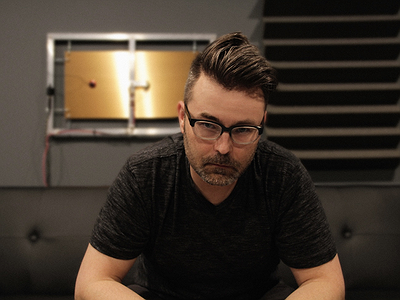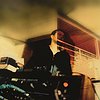Name: Mike Schommer
Nationality: American
Occupation: Producer
Current Release: Anamnesis on Mosaic Records
Recommendations: I would recommend checking out the Inspiring art of my father Dennis Schommer and also the haunting masterpiece “Ambre” by Doyeq.
Website / Contact: If you enjoyed this interview with Mike Schommer, visit his Facebook profile for current news and updates.
When did you start writing/producing music - and what or who were your early passions and influences? What what is about music and/or sound that drew you to it?
In the early 90’s I wrote songs while playing guitar in various punk and industrial acts, so you could say my earliest influences were of that ilk. In 1994-95 I was introduced to a wider range of electronic music and started to appreciate artists that featured more minimal and experimental elements in their music. I was tired of song structures, writing rules, and relying on other people to co-create and produce, so the biggest attraction to electronic music was that it provided a home where I could toss out all of the rules and produce music on my terms.
For most artists, originality is first preceded by a phase of learning and, often, emulating others. What was this like for you? How would you describe your own development as an artist and the transition towards your own voice? What is the the relationship between copying, learning and your own creativity?
Not to sound too philosophical, but I think the development process is much like life in general. We start out knowing very little about the world, so we look to mentors to help guide us along. When beginning my journey into electronic music, I was very fortunate to have my friend Rod Modell near. He helped me a great deal along the way while I honed my skills, and I owe a great deal to his mentorship. Today, I pick up production techniques from early artists from the 50's such as Roy Orbison and Bobby Darin. Call me crazy, but I draw a lot of inspiration from traditional music and pull elements that I use in nontraditional ways. It's a mash-up of past experiences, ideas and techniques made a new that form my voice as an artist.
What were your main compositional- and production-challenges in the beginning and how have they changed over time?
I had to make the transition from a three-piece live act to solo recording artist, so the biggest challenges were learning new instruments. Instead of banging on a guitar, I had to learn how to program a synthesizer. We didn't have the internet in the same way we do today, so I couldn't get instant answers to all of my questions or download manuals at the click of a button. I would work a long time with a new piece of gear to try and get to that "Aha" moment when everything snaps together and makes sense.
There was one synthesizer, in particular, that was challenging. The manual was in German and the only other person I knew that owned the same one was Mike Huckaby. Fortunately, he offered to spend some time showing me some tips. If you didn't know someone personally that could help out with a few pointers, you pretty much just had to work it out yourself, which is always frustrating to a newbie.
What was your first studio like? How and for what reasons has your set-up evolved over the years and what are currently some of the most important pieces of gear for you?
My first studio was nothing more than a buggy sampler, a homemade kick drum machine, and some cheap guitar effects. I was pretty much limited to what was available in the hock shops and stores near me at the time. My studio was constantly changing too. I used different gear on each record I recorded, but they still shared the same sonic characteristics. It was through this observation that I found out that no matter what synthesizer I was using, I always managed to carve out similar tones. Today, I place most of my emphasis on developing an exceptional workflow more than anything else. If you have a great workflow you can be ten times more productive, and things won't blow up when you introduce a new element be it a synth, effect unit or anything else.
How do you make use of technology? In terms of the feedback mechanism between technology and creativity, what do humans excel at, what do machines excel at?
It is interesting how we use our creativity to build tools to help us become more creative. I have always felt that the synthesizer is to a musician as the paintbrush is to an artist. Both tools are exclusive in their use and aid in expressing inspiration, but we have to remember that they are not the source of that inspiration. We need to resist the temptation to believe that all of our answers lie in technology alone. Technology must always serve us in our art and not the other way around. At one point in my life, I found myself becoming subordinate to the technological abilities of machines. It's counter intuitive and wrong. Did the bristles speak to Van Eyck, or did he command the brush? Command the brush! Command the synthesizer!
Production tools, from instruments to complex software environments, contribute to the compositional process. How does this manifest itself in your work? Can you describe the co-authorship between yourself and your tools?
I wouldn't go as far as saying that my relationship with my tools constitutes co-authorship. It's more based on necessity and is noncommittal in nature much like a relationship a sculptor might have with his chisels. The artist is focused on the marble as he pounds his hammer to reveal the image. I’m a selfish musician in this regard, and I will not give a lot of credit to machines for my work. I think it's a legitimate question, but would a sculptor say his recent creation was co-authored with his chisels? Software, synths, and effects are nothing more than brushes, chisels and paint to me.
Collaborations can take on many forms. What role do they play in your approach and what are your preferred ways of engaging with other creatives through, for example, file sharing, jamming or just talking about ideas?
No doubt that jamming was where a lot of great ideas were born when I was involved in more traditional bands. I think that approach lends well in that environment, but file sharing is the most effective means for electronic music. Most collaborations are done over great distances and in varying time zones, so being able to work on a project within your schedule is helpful. I rarely talk about specific ideas, but what I really enjoy are those informal "collaborations" that take place on front porches. They are the exchanges over the role of noise in music or discussions over what brand of coffee is best for producing ambient music during a snowstorm.
Could you take us through a day in your life, from a possible morning routine through to your work? Do you have a fixed schedule? How do music and other aspects of your life feed back into each other - do you separate them or instead try to make them blend seamlessly?
When my alarm goes off at about 5:30 AM I roll out of bed and begin my day by getting the older kids motivated for school. I’ll read a little bit and take care of emails while they're getting ready. We spend time in the car critically listening to what I worked on the day before, and I dictate the changes I want to make on the tracks to my son who puts the notes on my phone. (I reference them later in the studio. I’ve had to learn to take advantage of the small opportunities). After the kids are dropped off, I work on web
development and e-commerce projects until the afternoon. I try to sneak in some studio time prepping things for the evening if the kids don't have piano or BMX practice. After dinner, there are a couple of hours of complete and utter chaos (I mean... family time). If the little ones cooperate, I can usually get them to bed on the 3rd or 4th attempt. If the older kids are good with their homework and my wife is settled in for the night, I’ll make a large pot of coffee and head to the studio to work. Once I’m satisfied with the results for the evening, I’ll crawl into bed and almost immediately the alarm goes off!



